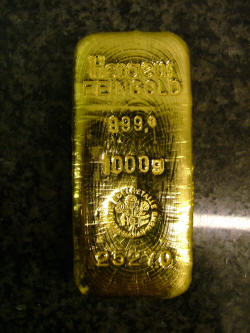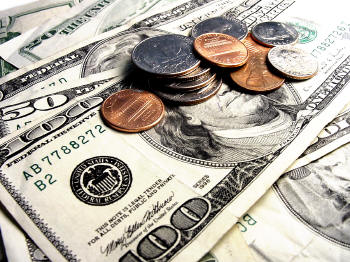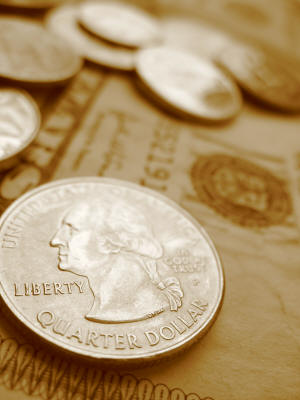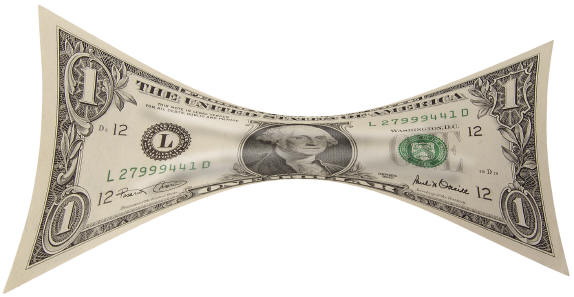What’s driving
DOWN The
DOLLAR?
By Linda S. Heard

In May, the Kuwaiti government abandoned the dollar peg to curb soaring
inflation triggered by the high cost of imports from Europe and the Far East.
This came on the heels of similar decisions by Russia, China and Malaysia. The
Kuwaiti Dinar is now linked to a basket of currencies and is set to increase in
value by 0.35 per cent by the end of the year. It might have been more but
Kuwait decreased interest rates in order to deter speculators. Other GCC
countries, including the UAE, are reluctant to follow suit. Sultan bin Nasser Al
Suweidi, Governor of the UAE’s Central Bank has described his country’s dollar
peg as a stable anchor for the economy. Until comparatively recently, few could
argue with that statement. But how stable is the dollar now?
July 3 was a black day for the dollar which traded one cent short of a record
low against the euro at $1.3611 and experienced a 26-year low against the
British pound at $2.0197. Britain was recovering from thwarted terrorist
attacks, which made the pound’s strength against the dollar that much more
remarkable.
 This
dollar weakness was particularly bad news for Gulf expatriates who are paid in
dollars or dollar-linked currencies and who have monthly financial commitments
overseas such as home mortgages or families to support. This
dollar weakness was particularly bad news for Gulf expatriates who are paid in
dollars or dollar-linked currencies and who have monthly financial commitments
overseas such as home mortgages or families to support.
People who receive their pensions in dollars are also affected. A friend who
spent his life working with UNESCO complained that 25 per cent has been lobbed
off the value of his pension.
Most hope that the dollar’s fragility is merely a temporarily blip and are
prepared to ride the storm. But a growing number of financial experts are
warning there is worse to come with a few bearers of doom and gloom saying the
greenback may never recover.
Let’s look at the factors driving the dollar down.
- Interest rates have recently played a role in the dollar’s descent. The Bank
of England has increased the base rate to 5.75 per cent partly in an effort to
slow down the over heated British housing market. And it’s anticipated that the EU, which has held rates steady at 4 per cent, will raise them later in the year
to reflect strong growth.
On the other hand the US is constrained because its housing bubble has burst
with a bang, which means if the Federal Reserve increases interest rates
property sales could stagnate further. This would, in turn, have a knock-on
effect on consumer spending and possibly trigger a recession.
Moreover, as the IMF warned earlier this year, the dollar value needs to decline
to reduce US debt and narrow the $765 billion trade deficit. This, in effect,
means that due to the devalued dollar the US gets a discount on its imports,
which is not good news for exporters.
Naturally, more and more currency speculators, investors and savers are lured by
the higher interest rates on Sterling and the Euro, which have proved to be more
stable than the dollar.
- Phenomenal growth throughout the euro zone has made Eurobonds more attractive
to investors than dollar-denominated bonds. Indeed, Eurobonds have greatly
outpaced their dollar rivals.
- Central banks have begun to diversify their foreign reserves. In March,
China’s Central bank announced that China does not intend to accumulate any more
foreign reserves, while Syria and Iran have eliminated the dollar completely.

- Countries in the Middle East and the Gulf are diversifying their investments
overseas and investing money that would have once been held as foreign reserves
to fuel their own economies. This is particularly true in the case of Saudi
Arabia, Bahrain and the UAE.
- There is the worry that oil exporting countries will begin trading in Euros or
other currencies as Iraq did before it was invaded and Iran, Libya and Venezuela
threaten to do.
This would translate to oil importing countries - currently forced to hold large
reserves of petrodollars – being free to dump dollars in favour of other
currencies. Currently 66 per cent of central bank reserves worldwide are held in
dollars.
If that were to happen the dollar would lose its coveted position as the global
reserve currency when the US would find its grip on world economies greatly
loosened. There could conceivably be a domino effect that would lead to a giant
sell-off and a massive decrease in value.
Furthermore, if the dollar were to lose its importance relative to oil its real
worth would come under increased scrutiny in relation to the US economy, trade
deficit and fiscal debt.
Americans have generally been living above their means for many years. Their
consumption is high and so is their borrowing. Incredibly, in mid-2007, their
National Debt was $8.8 trillion or $28,000 per capita of the population.
At the same time the US government is in the red as much as $9 billion or seven
per cent of GDP.
GDP is due to rise only 2.1 per cent this year – down from 3.3 in 2006.
Plus, a decrease in manufacturing, investment and increased job outsourcing are
damaging America’s ability to compete in the global marketplace.
This depressing data means that although the dollar has fallen to historic lows,
its real value based on economic factors could be a lot less.
There is a likelihood that there are fewer dollars circulating throughout the
world than their used to be as the Federal Reserve is no longer willing to
publish its figures.

This unwillingness to be transparent does not inspire investor confidence and
elicits such questions as ‘what are they hiding?’ Are they concerned that if the
flight from the dollar becomes public knowledge, the trickle will turn into a
flood?
Addison Wiggin, the editorial director and publisher of the Daily Reckoning and
the co-author of “Financial Reckoning Day: Surviving the soft depression of the
21st century” asks “Does this mean the age of America is ending?” answering his
own question with “No. It simply means that economic muscle will be flexed by
someone else in the future”.
Countries tipped to fill the gap and keep the global economy afloat are Japan,
China and India together with the Euro Zone.
However, there is another point of view reflected by Anatole Kaletsky column
titled “Demise of the dollar is greatly exaggerated” published in The Times last
December.
Kaletsky admits that “newspaper headlines are screaming that the dollar is
becoming worthless, while market leaders, central bankers and politicians seem
to be in unanimous agreement that there is only one way for the US economy and
currency to move from now on and that is down”.
“Rarely in living memory has an important currency, or any financial asset, been
as friendless as the dollar is today,” he says.
But despite the signs, Kaletsky is optimistic. He believes the American economy
will reaccelerate later this year, while those of the Euro Zone and Britain “are
likely to suffer a severe slowdown if the euro and the pound remain at anywhere
near present levels against the dollar and the Asian currencies”. And, thus, he
predicts “a big change of direction in the currency markets is probable”.
Billionaire businessman and philanthropist Warren Buffet disagrees. He has
advised investors to “build an ark” to protect themselves against the descending
dollar. Former head of the Federal Reserve Board Paul Volcker has predicted at
75 per cent chance of an economic crisis within two years, while a former
researcher at the IMF Kenneth Rogoff warns the dollar could ultimately drop 40
per cent off its value.
If and when GCC states finally get around to adopting a common currency in 2010
when a common market is due to be formed, it will be interesting to see whether
the single Gulf currency will be linked to the dollar. The joint decision will,
no doubt depend on the dollar’s status at that time and whether member states
can agree on whether to peg or not to peg. Much will also depend on whether the
GCC wants to set interest rates in keeping with their growing economies rather
than having to adhere to US interest rates, currently devised for a slowing
economy.
There was talk of setting up a common currency earlier but the Kuwaiti decision
has put a spoke in the wheel. The Deputy Governor of the Saudi Central Bank
Mohammed Al-Jasser described the proposed monetary union as having become “more
difficult” due to Kuwait’s switch while Mr. Al-Suwaidi says he doesn’t know what
prompted Kuwait “to deviate” from the consensus of its fellow GCC members.
Three years is a long time in terms of currency fluctuations and trends. Global
economies and currencies will have ebbed and flowed. There will be a new team in
the White House with new policies and strategies. The GCC would do well to adopt
a wait and see approach.
Some experts say there is a political component to the dollar’s weakness. In
that case, a new US administration might be able to mend fences and build
bridges with countries now contributing to the dollar’s downward spiral. On the
other hand, there may be new wars; unpredictable wars being waged, which could
elevate oil prices and heap further pressure on the dollar.
While they wait, some cautious investors are turning to gold along with
traditional safe haven currencies. The euro and the pound are also big
winners…but for how long?
Will the dollar ever reign supreme again or will its global monopoly become a
mere footnote in history? If anyone could answer that they would not only be
clairvoyant but super rich. Sadly, I’m neither.

|